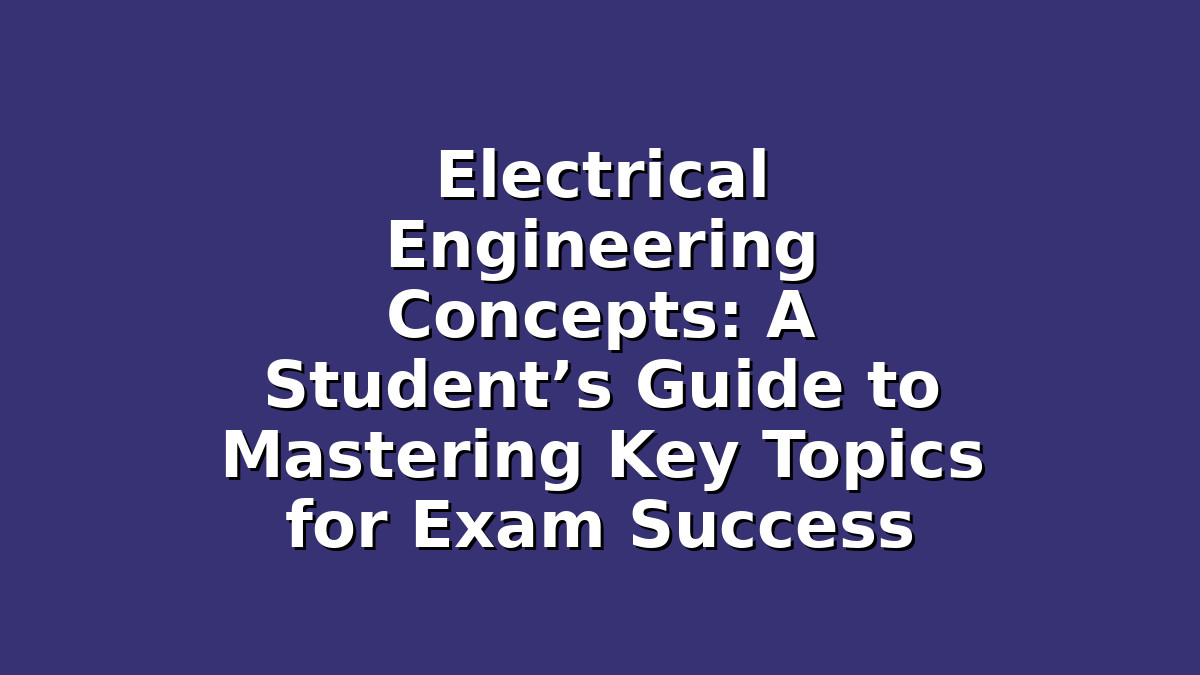Electrical engineering is a fascinating and dynamic field that forms the backbone of modern technology. From powering homes to enabling smartphones and advancing renewable energy, electrical engineering concepts are fundamental to the innovations shaping our world. For students preparing for exams, understanding these concepts deeply and efficiently is crucial—not only to score well but also to build a solid foundation for future careers.
This guide is designed specifically for electrical engineering students who want to grasp essential concepts and develop effective study strategies. Whether you’re tackling circuit theory, electromagnetism, or signal processing, this comprehensive overview will help you approach your studies with confidence and clarity.
Understanding Core Electrical Engineering Concepts
Before diving into study tips, let’s briefly review some of the core concepts every electrical engineering student should master:
– Circuit Theory: This involves understanding how electrical circuits function, including concepts like voltage, current, resistance, Ohm’s law, Kirchhoff’s laws, and the analysis of series and parallel circuits.
– Electromagnetism: The study of electric and magnetic fields, electromagnetic forces, and how they interact. Topics include Faraday’s law, Maxwell’s equations, and inductance and capacitance principles.
– Signal Processing: How electrical signals are generated, manipulated, and interpreted. This area covers analog and digital signals, Fourier transforms, filtering, and modulation techniques.
Now, let’s explore three detailed sections tailored to help you study these concepts effectively.
1. Break Down Complex Theories with Visual Aids and Practical Examples
Electrical engineering can be conceptually dense, and many students struggle with abstract theories. One of the best ways to tackle this challenge is through visual learning.
– Use Diagrams and Circuit Simulators: Drawing circuit diagrams by hand helps reinforce understanding of how components connect and interact. Additionally, software tools like LTspice, Multisim, or online simulators allow you to build and test circuits virtually. Seeing the behavior of circuits in real-time strengthens your grasp of theoretical principles.
– Create Concept Maps: For topics like electromagnetism, mapping out relationships between electric fields, magnetic fields, flux, and forces clarifies how these parts interrelate. Concept maps transform complex topics into digestible, interconnected ideas.
– Relate Theory to Real-World Applications: When studying concepts like inductance or signal modulation, link them to real devices—transformers in power grids or modulation in radio communication. This relevance makes abstract ideas more tangible, enhancing recall during exams.
Study Tip: After reviewing a topic, try to explain it aloud as if teaching someone else. This “Feynman Technique” helps identify gaps in your knowledge and solidifies understanding.
2. Practice Problem-Solving Regularly with Past Papers and Timed Quizzes
Electrical engineering exams often test both theoretical knowledge and application skills. Consistent practice is essential for success.
– Work Through Past Exam Papers: Past papers give insight into the exam format, frequently tested topics, and the level of difficulty. Time yourself when solving these papers to simulate exam conditions, which improves your time management and reduces anxiety.
– Focus on Variety and Difficulty: Start with simpler problems to build confidence and then gradually tackle more complex questions. This approach prevents feeling overwhelmed and promotes steady progress.
– Use Step-by-Step Problem-Solving Methods: For circuit analysis, practice systematically—identify known variables, select the right equations, solve stepwise, and verify answers. This organized process reduces careless mistakes.
– Join Study Groups or Forums: Collaborating with peers allows you to exchange problem-solving techniques and get help on tricky questions. Platforms like Stack Exchange or university forums are excellent for engaging with a wider learning community.
Study Tip: Keep a dedicated notebook of solved problems with detailed solutions. Reviewing these notes before exams reinforces methods and improves speed.
3. Master Mathematical Foundations and Use Efficient Study Techniques
Mathematics is integral to electrical engineering, so strengthening your math skills is crucial.
– Focus on Key Math Topics: Pay special attention to calculus, differential equations, linear algebra, and complex numbers, as these are frequently used in circuit analysis, signal processing, and electromagnetics.
– Learn Mathematical Tools Used in EE: For example, understanding the Laplace transform or Fourier series can demystify how signals transform from time to frequency domains, a common exam topic.
– Break Study Sessions into Focused Intervals: Use the Pomodoro Technique—study for 25 minutes, then take a 5-minute break. This method improves concentration and prevents burnout.
– Summarize Formulas and Theorems: Create a formula sheet or flashcards for quick review. Regularly testing yourself on these aids memorization and builds confidence.
– Use Online Resources and Video Tutorials: Sometimes a different explanation or visual demonstration can make a difficult concept clearer. Websites like Khan Academy, MIT OpenCourseWare, or YouTube channels dedicated to electrical engineering offer valuable supplementary lessons.
Study Tip: Avoid passive reading. Instead, actively write out derivations, solve equations by hand, and challenge yourself with “what if” scenarios to deepen comprehension.
Conclusion: Building Confidence Through Consistent Effort and Smart Study Habits
Mastering electrical engineering concepts is a journey that requires patience, persistence, and smart study strategies. Remember, understanding theory is just as important as applying it through problem-solving. By using visual aids, practicing regularly with real exam questions, and strengthening your math foundations, you’ll be well prepared not only for your exams but also for a successful career in electrical engineering.
Stay positive and consistent—every small step forward builds your knowledge and confidence. With dedication and the right approach, you can conquer even the most challenging electrical engineering topics.
Good luck with your studies!

Responses